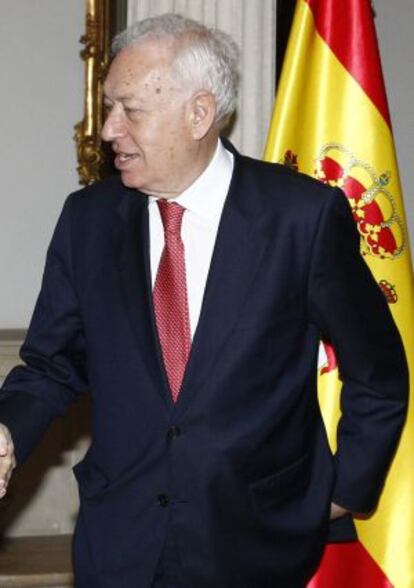Spain will not oppose Scottish EU entry: foreign minister
But García-Margallo warns that re-entry to the Union will take considerable time

Spanish Foreign Minister José Manuel García-Margallo has stated that should Scotland elect to break away from the United Kingdom, Spain will not oppose the move because it does not have any bearing on the internal affairs of the country. “If the Constitution of the United Kingdom permits – and it seems that it does – that Scotland call a referendum on their possible independence, we will say nothing on the matter,” he said in an interview with the Financial Times.
However, the minister adhered to the Popular Party (PP) administration’s line over Catalonia’s own designs on a referendum for independence; one of staunch resistance.
“The cases of Scotland and Catalonia are fundamentally different,” García-Margallo said, adding that Spain would not stand in the way of Scotland being admitted into the European Union. “If Scotland becomes independent in conformity with legal and institutional procedures, its request to form part of the EU can be considered. In the contrary case, it cannot.”
Scotland’s referendum will be held on September 18 with the full blessing of British Prime Minister David Cameron. The question to be put to Scots will be: “Should Scotland be an independent country?”
Catalonia intends to hold its own ballot on November 9, despite the protests of the PP and Prime Minister Mariano Rajoy, who has warned: “The referendum will not be held. It is unconstitutional.” If the status vote does go ahead, Catalans will be asked: “Do you want Catalonia to become a state?” In the affirmative, “Do you want Catalonia to be an independent state? Yes or no.”
García-Margallo also noted that if Scotland does vote yes, it is unlikely it will be admitted to the EU before its scheduled breakaway date of March 24, 2016. “They have to first reach the level of candidate country. There are 35 steps to negotiate, then it has to be ratified by the EU institutions. And then by the 28 parliaments of the member states.”
Tu suscripción se está usando en otro dispositivo
¿Quieres añadir otro usuario a tu suscripción?
Si continúas leyendo en este dispositivo, no se podrá leer en el otro.
FlechaTu suscripción se está usando en otro dispositivo y solo puedes acceder a EL PAÍS desde un dispositivo a la vez.
Si quieres compartir tu cuenta, cambia tu suscripción a la modalidad Premium, así podrás añadir otro usuario. Cada uno accederá con su propia cuenta de email, lo que os permitirá personalizar vuestra experiencia en EL PAÍS.
¿Tienes una suscripción de empresa? Accede aquí para contratar más cuentas.
En el caso de no saber quién está usando tu cuenta, te recomendamos cambiar tu contraseña aquí.
Si decides continuar compartiendo tu cuenta, este mensaje se mostrará en tu dispositivo y en el de la otra persona que está usando tu cuenta de forma indefinida, afectando a tu experiencia de lectura. Puedes consultar aquí los términos y condiciones de la suscripción digital.








































